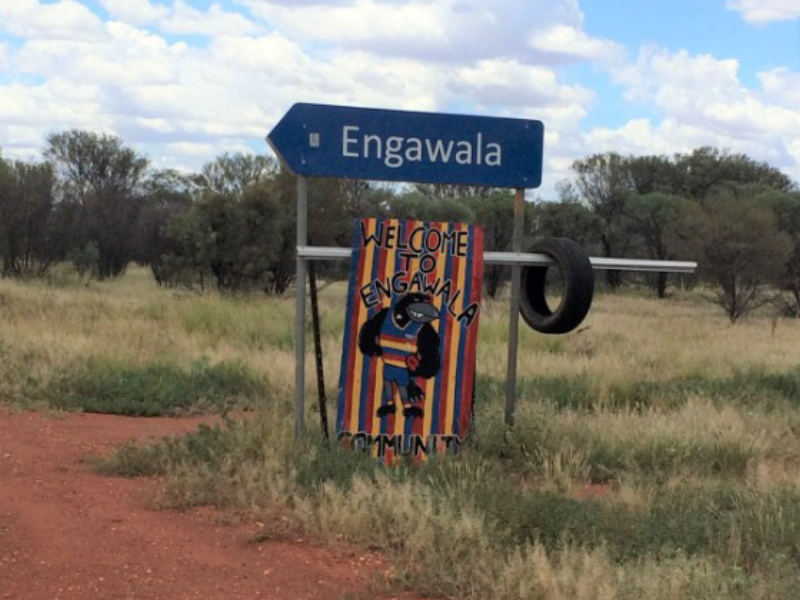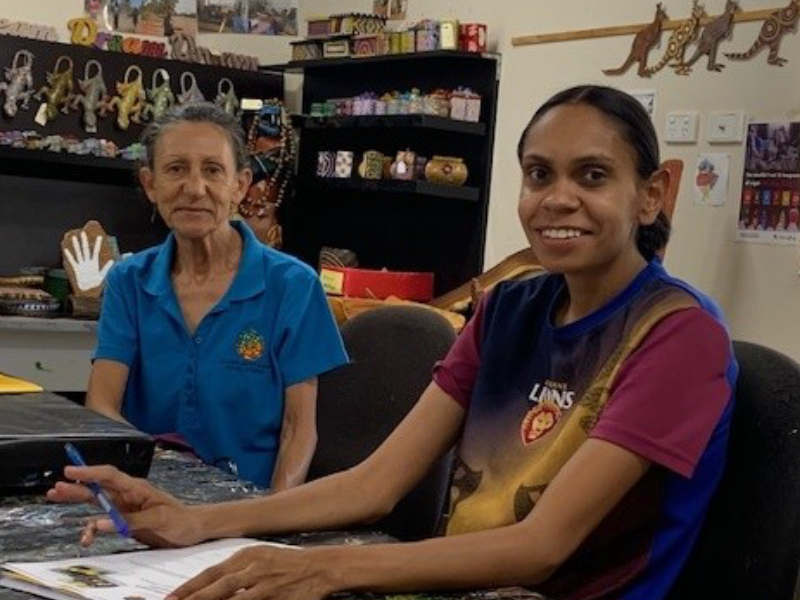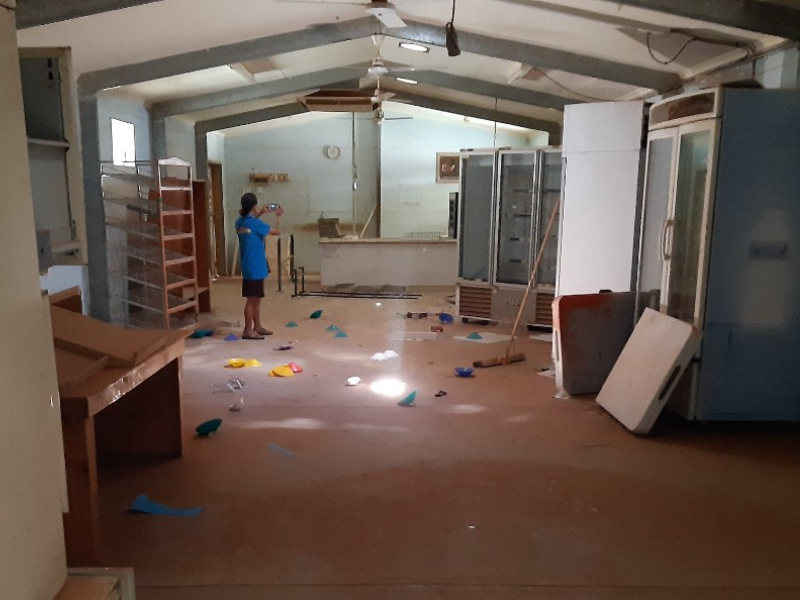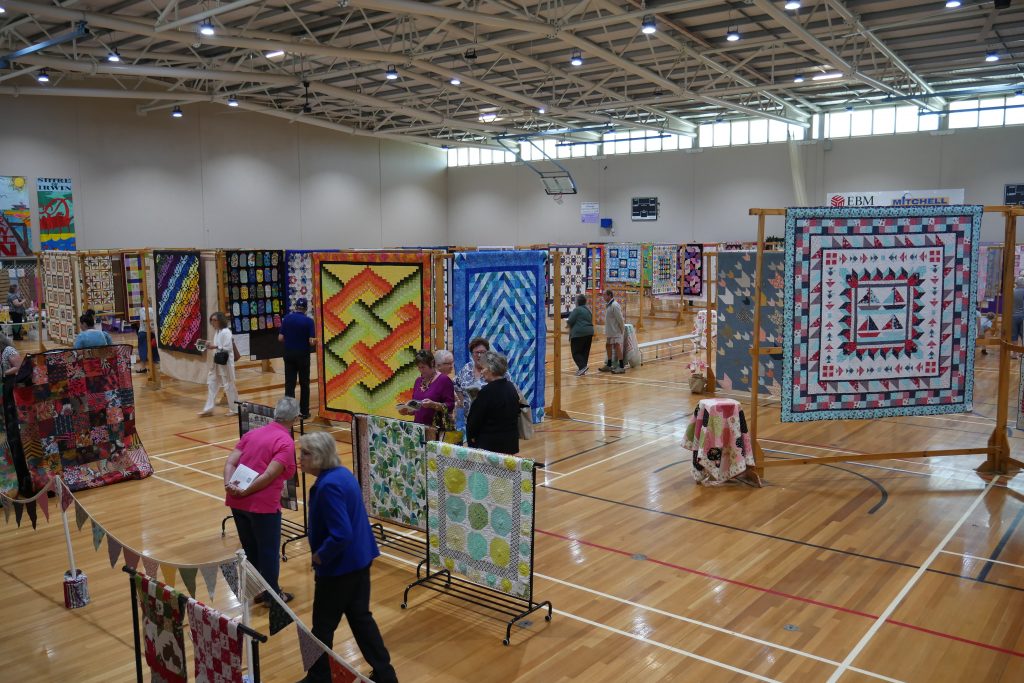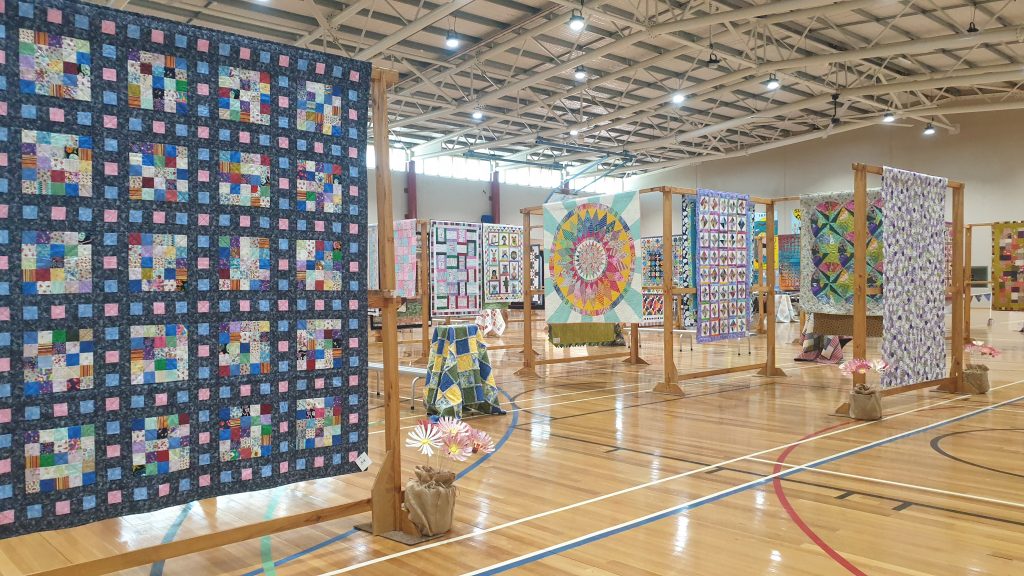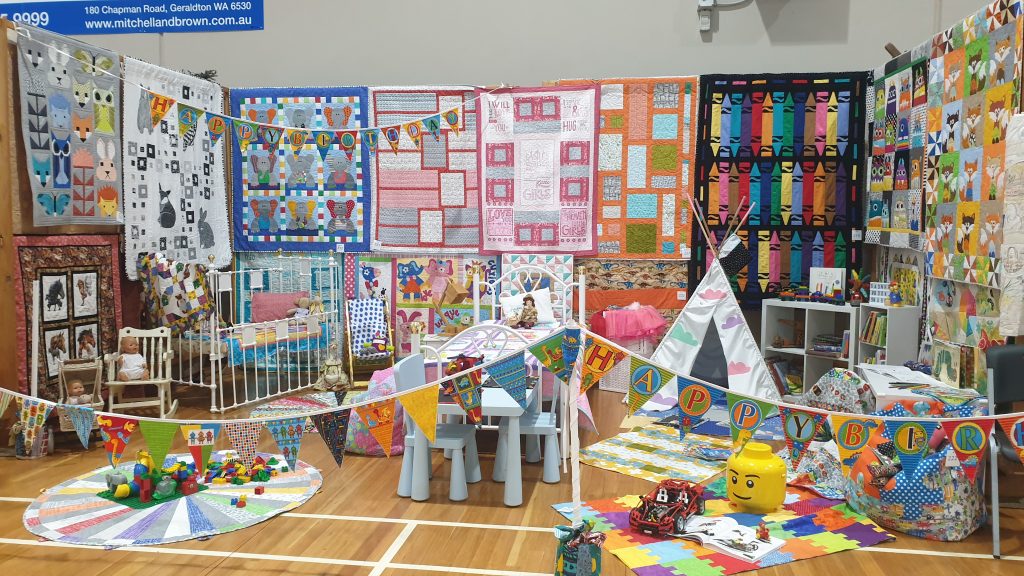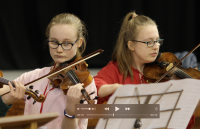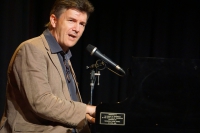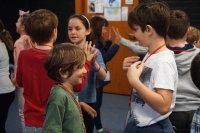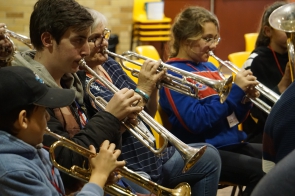Foundation for Rural & Regional Renewal (FRRR)

The Arapiles Community Theatre (ACT) is a local volunteer-led arts organisation that supports a wide range of creative practices, helping artists develop their work, and regularly hosting arts events at the local Natimuk’s Soldiers Memorial Hall. They’re dedicated to keeping the arts scene vibrant in the local Wimmera region and promoting local artists and their work.
Although it’s a beautiful old brick building, the Memorial Hall has some limitations, particularly when it comes to the audiovisual (AV) equipment. It requires IT expertise to set-up and troubleshoot any issues, which makes it hard for volunteers to use the equipment and discourages many from booking the venue.
This led to ACT applying for a grant to purchase a simple ‘plug and play’ AV system, which is easy for those with limited IT knowledge to use, yet still ensures high-quality projection and sound and delivers a satisfying experience for both the user and their audience.
ACT received a $5,000 grant from FRRR through the Nutrien Ag Solutions Community Grants program. Coupled with an equal grant from the Horsham Rural City Council, they were able to buy a comprehensive and permanent AV system for the Hall. While the heritage hall presented difficulties, the community’s determination saw them through. They faced and overcame the hurdles, learning and showcasing their skills during the process.
This investment in a meaningful, community project plays an important role in the viability of the hall and the vibrancy within the region. The long-term benefits for the broader community are highly significant. With new, easy-to-use equipment, more people want to rent the hall. The new AV system meets the high standards required for visiting screening opportunities, which helps ACT committee host more events and consequently, makes the hall a better place for social, economic, and cultural connections.
In finalising their project, Jacqui from the ACT committee said that this grant was fantastic for their hall and community. They expressed gratitude to FRRR and Nutrien Ag Solutions for their support. The revitalisation has led to more upcoming upgrades and has brought a positive impact to the entire region.
The Kyabram Development Committee consists of an enthusiastic group of locals who recognised the need to inject some excitement, connection and economic support into their community. In the words of one of their committee members the goal was to ‘get Kyabram back on the map’, referencing the town’s off-the beaten track location between popular tourists’ routes. The Committee observed a large strain on the mental and financial wellbeing of their town’s residents, and were determined to do something about these challenges.
A $5,000 grant from FRRR’s Gardiner Foundation Community Grants program was pooled with the organiser, Kyabram Development Committee’s own fundraising, along with funding from the local Bendigo Bank, Ky Valley Dairies and other sources, to put on the Kyabram Tastes & Tunes street festival.
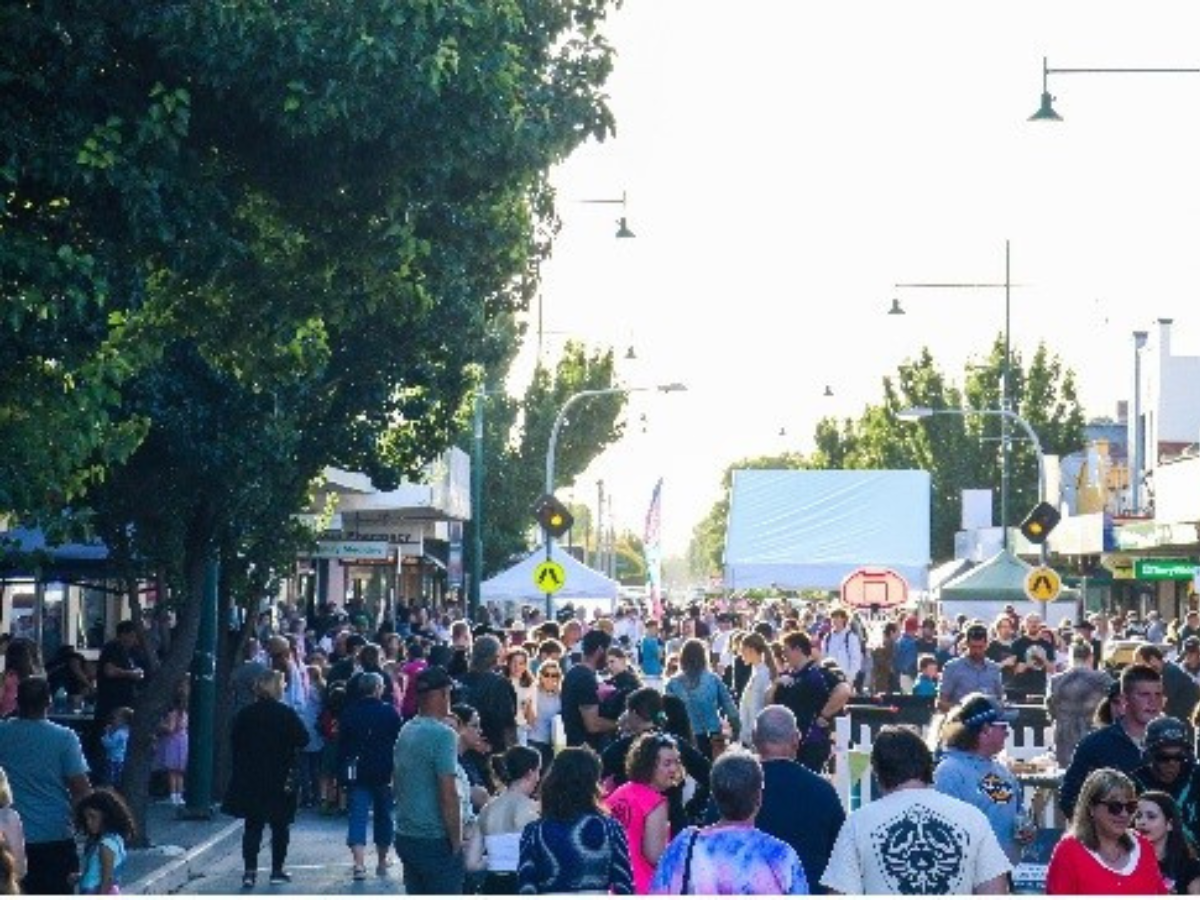
The Festival was successful in meeting its goal of fostering community connections. The Committee aimed to attract 1,000 people, but exceeded this with a bustling crowd estimated at around 4,000, demonstrating the event’s tremendous success. The Festival not only brought significant financial gains for local businesses, but also allowed Kyabram to highlight its strengths by featuring local products and produce. Positioned in the heart of one of Northern Victoria’s largest dairy and fruit orchard regions, the Festival provided numerous tasting opportunities. Additionally, it underscored why Kyabram is a fantastic place to live.
The FRRR grant funded Festival entertainment, which featured diverse offerings to attract all age groups. For children there were activities like face-painting, Youth Club games, fairy floss, and more. Adults enjoyed live music from both local performers and internationally recognised acts such as The Baker Boys. The town buzzed with people mingling and enjoying good company, delicious food and entertaining performances.
Committee member Tania reported that the night was amazing and it’s been suggested it’s the best family event ever held in Kyabram. This event went a long way towards the Committee’s aim of making it an annual, unmissable opportunity to visit the town.
The Kyabram Tastes and Tunes Festival certainly achieved many of FRRR’s Gardiner Foundation Community Grants program objectives. It effectively contributed to building community resilience, fostering cultural vibrancy, strengthening economic vigour, and importantly, improving community health and social wellbeing. On a final note, the Kyabram Development Committee thanked FRRR and the Gardiner Foundation for their donation, emphasising its vital role in the success of the event.
Engawala, also known as Intiarntwa, is a remote community 200 kms northeast of Alice Springs. It has a women’s centre, childcare facility, school, remote health clinic, Council office and recreation hall with a youth program servicing the 150 people that live there. Excitingly, it will soon also be home to the Engawala Art Centre.
The Engawala Art Centre Aboriginal Corporation (EACAC) formed in 2019 and is overseen by a committee of five. Twelve local artists have been making the 400 km round trip to Alice Springs to sell artworks, with the cost of travel a drain on their income. There was agreement that it would be ideal if they had their own Art Centre where they could paint and have a gallery to sell to the public.
Long-term impacts
The benefits of a strong arts and crafts sector are far-reaching. Establishing and building the capacity of Indigenous art centres goes a long way to sustaining remote communities. They play an indispensable role – as a place of cultural leadership, language and identity, community engagement and are often also a provider of essential social and wellbeing services. They are a link to the mainstream art market and, when operating effectively, these enterprises can be a key source of income, training and employment.
Recognising this, the EACAC developed plans for a dedicated Art Centre in the community and set about making it a reality. In 2021, they applied to FRRR’s Strengthening Rural Communities program (Small & Vital stream) for a grant to cover administrative costs during the start-up phase. This would cover subscriptions to the Stories, Art, Money (SAM) software program; membership of Desart, the peak Arts body for Central Australian Aboriginal Arts and Crafts centres; telecommunications equipment; promotional signage; and art materials.
With strong letters of support and partnerships in place, the application was successful, and the group was awarded $8,595, thanks to the Yulgilbar Foundation.
Getting it right with upskilling and the tools for the job
The EACAC maintains that the most valuable outcome has been the employment and training of an arts worker. Once a week, an experienced volunteer has visited the Engawala Community to do training, with other training completed remotely, via the new phone. This meant the project could continue in between visits. The Centre’s arts worker now has all the basic skills for running an office and working with the SAM database, even attending an advanced course in using SAM at Desart in Alice Springs.
“While we have secured funding from the Commonwealth Department of the Arts to continue her employment, we would not have got to this stage without support from FRRR. Their grant to our Art Centre is allowing us to go from strength to strength.
“The equipment purchased through the grant has also made a critical difference. We cannot operate the Centre without the phone, and the iPad and scanner have made the recording of artworks for upload to SAM possible. Previously this was done using a borrowed mobile phone, which was very time consuming and unsatisfactory.”
Building for the future
While the renovation of the old shop for the new Centre was heavily delayed, the group sees the silver lining – they had had extra time to prepare to hit the ground running.
The EACAC is now actively promoting of the Centre which was opened by the NT Minister for the Arts in August this year., The Centre has worked with nearby Gemtree Tourist Park to provide short tours to see the artwork billboards on the Plenty Highway followed by a visit to the Art Centre. The billboards, some depicting work by Engawala artists, are part of the Outback Way Outdoor Gallery project which was also supported by FRRR.
The Art Centre project has also helped to open up new markets, bringing with it more resources to continue to grow the Centre. The artists sold an impressive $13,000 worth of Engawala artists’ paintings in one day at the Desert Mob Marketplace in Alice Springs, assisting them with paying for items they could not secure funding for such as electricity and insurances.
“While not our biggest financial partner (the bulk of our fundraising was for the renovations), FRRR’s contribution towards our project was critical at an important development phase. Many projects fail at this juncture between getting the ideas and finding substantial financial support. In a commercial sense, the funding was critical in terms of kick starting the project.
David (Taffy) Denmark, volunteer Business Advisor
“We appreciate the flexibility FRRR has shown – something not evident in some government funding programs. This is one of the major strengths of the philanthropic movement.”
A huge congratulations to the committee and all those involved in the project to date. By deciding to professionalise the management of the Arts Centre, this group is building a place for employment, training, business opportunities, tourist-based income, cultural maintenance, pride, “a laugh and a cuppa”, and thus strengthening the Engawala community for the future.
The Dongara Patchwork Club meet in the WA fishing town of Port Denison, which is located almost four hours north of Perth. Every three years, the club hosts a ‘Hanging of the Quilts’ event to exhibit new works completed by club members and the event draws tourists into town, supporting the local arts economy.
In October 2019, the Dongara Patchwork Club used a $4,403 Strengthening Rural Communities grant to fund the event. The grant was used to support venue hire, catering, printing, raffle tickets and advertising. The club members transformed the stadium at the Rec Centre into a Quilters Haven for the day and created ‘themed rooms’ that helped visitors to get inspired, be introduced to the craft or just to appreciate the talents of the local quilters.
The event featured quilts that had never been displayed, as well as demonstrations, art displays, raffles, quality market stalls, and a vintage car display that was located adjacent to the building. The 2019 ‘Hanging of the Quilts’ event also provided an opportunity for other local community groups to get involved, with the Veteran Car Club, Dongara Denison Art Group, Geraldton Spinners/weavers and Lace Makers and the Pottery Club participating along with local producers who showcased their wares.
Not only did the event drive local arts tourism but the community also reported an increase in creative expression, strengthened social connectivity and reduced social isolation. The funds raised at the festival were enough to cover the groups running costs and their work within the community for the next three years.
The need for the diversification of industry has been well known to the Northampton community for many years, given the heavy reliance on agriculture. Drought and unpredictable seasons have seen the withdrawal of many farming families, leaving an ageing population. Northampton has a median age of residents that is significantly older than the national average.
To address this issue, several community groups worked toward a common goal – to leverage the significant tourism potential of the town and bring in more visitors and diversify income. Northampton has a rich heritage, being one of only three towns in Western Australia to have attained the ‘Historic Town’ status. The development of an arts trail is a key feature of the plan, and the Northampton Friends of the Railway sought to add to it with the development and installation of a large 5m x 10m public sculpture.
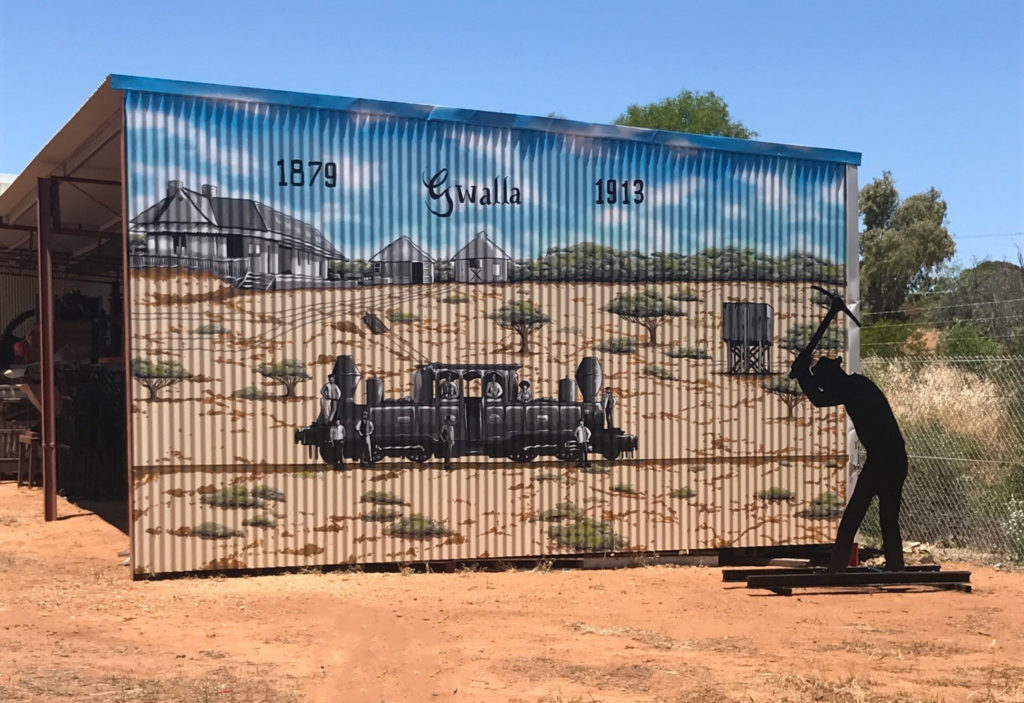
They worked with local artists and steel masons to design and construct the steal art sculpture with the $3,500 Strengthening Rural Communities grant, thanks to funding from the Bertalli Family Foundation, which was specifically used for its final design and painting. The piece depicts the historic Gwalla railway precinct with all of the original buildings of the railway station, some of which no longer exist, and is located exactly on a section of the first Government Railway in Western Australia. It’s an important interpretive piece to showcase the former area, given the significant role that the railway played in the township’s mining and agricultural history.
This project brought together economic, heritage and artistic outcomes, celebrating and promoting a unique local history.
The Circular Head Community has gone through some difficult times recently, with the downsizing and closing of some major employers following floods and bushfires in the area. A street art installation in the main street of Smithton brought the community respite from the empty shopfronts and buildings that were still in need of repair. The community wanted to find a way to encourage artistic expression, bring the community together and encourage visitors to their town, while building on the creative art that already existed. With the incredible talent they have locally, it made sense to put on a three-week celebration of visual, creative and performing arts in what became the ‘Art About Town’ festival. Circular Head Council hoped that the project would not only provide employment opportunities for local artists but would also help to improve community engagement and social cohesion and boost tourism and the local economy. Thanks to a $10,000 grant from FRRR’s ‘Strengthening Rural Communities’ grant program and funded by the Sidney Myer Fund, the community was able to do all that and more.
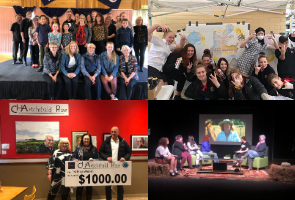
The Art About Town organisers spoke to local schools, old and young artists, musicians, teachers, students, members of the Circular Head Heritage Centre and Circular Head Aboriginal Corporation to provide a diverse and well-rounded program of events and activities.
As part of the celebration, four original artworks were commissioned from local professional artists. The last one was a whole community art installation, led by a local artist in collaboration with the local school and wider community. Locals could enter portraits into the ‘Chartchibald Prize’ exhibit, which was shown as a local café and had upward of 30 visitors per day. Members of the community were also given the opportunity to have their artworks and photographs displayed in a local shopfront makers space and in a gallery space, with a youth and open age category with prizes available for entries. There was also an arts trail for locals and visitors to enjoy.
Merrigum Primary School is a rural Victorian primary school with a small number of staff and students. The school is committed to building school capacity to provide students with educational opportunities through enhanced, personalised learning.
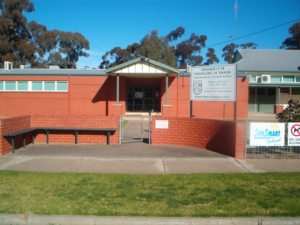
Many Merrigum Primary Students come from diverse backgrounds and some require additional learning support – something that the school community strives to provide them with. One of the areas where the school wanted to offer more support was music activities and education for the pupils.
In partnership with Merrigum Primary School, The Song Room, an organisation that delivers integrated music and art lessons in school delivered a six-month music program to students from Foundation to Year 6, working alongside their classroom teachers. The program was possible with thanks to a $7,500 REAPing Rewards grant.
Students greatly enjoyed the program and looked forward to their music lessons. Caitlyn Trotter, who led the program for students, told FRRR that the children responded well to all the activities.
“By the end of the lesson, they understood the basic (musical) terms. The children enjoyed being able to work together as a class and loved that they got to play an instrument as part of a song. This was always thoroughly enjoyed.”
This was reflected in the feedback from teachers, Belinda and Judi who reported that “The sessions were very well planned and built sequentially week after week to offer students the opportunity to develop skills at a targeted pace. The students had a lot of fun, and even some of the more reluctant musos were looking forward to class by the end of it.”
As part of the program, The Song Room also facilitated professional development lessons for the teachers, so that the music program could continue well beyond the formal end of The Song Room’s time at the school. Teachers were given lessons plans, games and instructions on how to facilitate music classes in a way that supports the current curriculum. Merrigum Primary School now also has ongoing access to more than 1,000 hours of online video resources from The Song Room to assist with planning and developing arts curriculum for students in the future.
When a popular city-based summer school music program made plans to bring the beat to the bush and put on a show alongside it, the whole community of Tenterfield NSW let the rhythm takeover.
Recently ravaged by drought and fires, the small town was experiencing some hard times. Charitable organisation Hartbeat of the Bush teamed up with the Cuskelly College of Music’s Winter Music School in a bid to provide Tenterfield and the surrounding communities with a brief respite from it all – the result was a week long ‘Beat of the Bush’ festival during the July 2019 holidays.
Dr James Cuskelly has run a Summer School music program in Brisbane for years, but it was his long-held dream to bring the music back to the bush, to his roots. Despite the evidence that incorporating music in a child’s education shows life changing benefits, such as improving literacy, numeracy, confidence, behaviour and wellbeing, 63 percent of primary schools in Australia offer no classroom music. In regional and remote schools, there is limited or no musical and arts based education, and opportunities for children to actively participate as performers and artists, under the mentorship of professionals and in front of an audience, is rare and for some non-existent.
Hartbeat of the Bush supports arts, music and cultural development programs in regional and remote communities. This initiative was designed as a whole of community project, to enable participants to socialise with others from across and beyond their region. In total, around 160 participants attended the Winter School, travelling from Brisbane, the Gold Coast, Toowoomba, Ashford, Texas and Newcastle and lots of other little places in between.
The program kicked off with the Big Chilly Sing, a day-long singing and song-writing workshop that gave locals a chance to converge and get the toes tapping. This was followed by a range of courses and concerts for students of all ages delivered by more than 50 teachers, many of whom are internationally-acclaimed.
A range of concerts were also put on by the Winter School music educators themselves, which were attended by 220 people each night. Locals and visitors alike were treated to a folk concert, jazz performances, a chamber music concert, an opera night, a piano concert and of course, the final night culminated in one of the biggest concerts Tenterfield has ever seen. The finale was a rendition of the legendary Peter Allen song Tenterfield Saddler, performed by all of the Winter School attendees, and arranged by Pete Churchill, who led the Jazz studies program.
Musical experiences like this help children develop social skills and build confidence. Children from all over the region who had never met one another, played an instrument nor sung in a choir before this program amazed their family members with the talent and skills they had learnt in just five days. Many of these children are still in contact with each other and cannot wait for the next event.
What’s more, the economic benefits for the town were significant, with cafes, restaurants and retail outlets benefitting from a lot of foot traffic at a time when the drought impact was being deeply felt. A large number of local community groups were involved in some way, from making lunches and morning teas to providing venues for the concerts.
Hartbeat of the Bush President Ms Helen McCosker said it was a whole of community effort.
“The whole community was abuzz – even though we had had fires, drought and could no longer drink the town’s water, we had provided the businesses with a little sense of what was normal, something to look forward to and grow for our little country town.”
The $20,000 grant received by Hartbeat of the Bush was funded by the Australian Government through FRRR’s Tackling Tough Times Together program. This covered the costs of running free daily buses within a 100 km radius for commuters from Warwick, Bonshaw, Glen Innes and Tabulum, as well as accommodation at the local Tenterfield Motor Inn for tutors (both overseas and those from Brisbane) and volunteers.
Storytelling is a vital part of Aboriginal and Torres Strait Islander culture, allowing beliefs and concepts to be passed on through generations. JUTE Theatre Company (JUTE) uses theatre performance and workshop participation to present professional role models and positive stories about a range of Indigenous experiences and possible futures.
Founded in Cairns in 1992, JUTE helps Indigenous students feel valued and connected, by letting them see their cultures and stories represented on stage. There are also longer-term benefits in employment and post-school options for young Indigenous people. Since the beginning of its Dare to Dream program, JUTE has impacted over 6,000 young people and community members in remote parts of North Queensland with more than 3,600 young people taking part in skills development workshops.
With the support of a $15,000 ANZ Seeds of Renewal grant, JUTE was able to take its 2019 show, The Longest Minute, to 10 North Queensland schools in Lockhart River, Bamaga, Mapoon, Mossman, Ravenshoe, Yarrabah, Mt Isa, Doomadgee and Cloncurry – all very remote locations with significant numbers of Indigenous students. The Longest Minute is a story about the 2015 National Rugby League Grand Final, won by local heroes, North Queensland Cowboys in a nail-biting finish.
The funding helped JUTE refine its school program to meet a broad range of needs across artists and facilitators, community, schools and students.
“It was fantastic,” said one of the Mapoon teachers. “The acting was incredible, and it offered our students an opportunity to see successful Indigenous people who are proud of their identity performing at their best. This is something we don’t have easy access to, being so remote.”
Despite the recent rain along much of the Eastern Seaboard, just a couple of hours inland our farmers and regional communities are still in the midst of a crippling drought. FRRR’s Tackling Tough Times Together (TTTT) program was launched last year to help communities across most of Queensland and the New South Wales Northern Tablelands to access the resources they need to support community based activities that both help to relieve current stressors and symptoms, but most importantly, build capacity and resilience for the future.
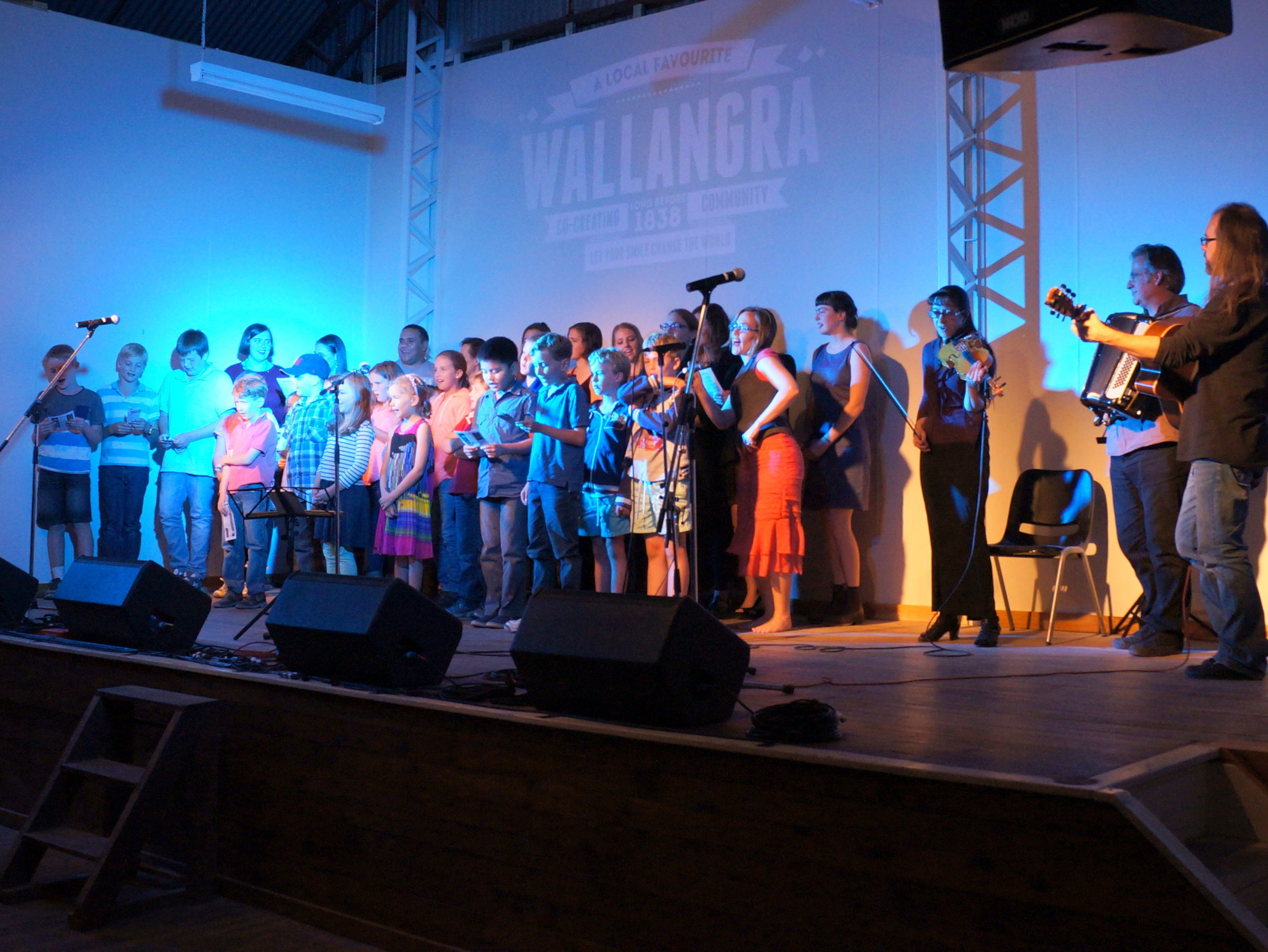
Festival demonstrates community resilience
The Wallangra Recreation Reserve Trust secured a $50,000 TTTT grant funded by the Yulgilbar Foundation to run the ‘Not Quite Baroque (Broke!) festival in Wallangra, 650 km north of Sydney in northern New South Wales. The two-day event celebrated the resilience of several small bush communities, involving a series of creative art and music workshops for local school children, workshops for adults and a music concert for the whole community.
The Inverell Times reported that the money was used to transform the Wallangra Hall into a fresh performance venue, triggering a series of art and music workshops, host a TED talk series and put on a concert of immense local talent.
A positive outlook for the future
The festival has now been declared inaugural, with all organisers and participants firmly committed to making this happen next year.
Event co-founder Helen McCosker felt the community had been energised and encouraged pursuit of events to re-invigorate people.
“They just need to come together and really work out a real plan, and real way of pushing their community to a point that there needs to be changed, and it needs to happen,” she said.
“And it can be done; it’s all possible. And we did it. It’s amazing. And we’ll keep doing it.”

